International Business: Analysis of Issues, Theories, and Market Data
VerifiedAdded on 2023/06/15
|13
|3979
|418
Report
AI Summary
This report provides a comprehensive overview of international business, focusing on key contemporary issues such as trade protectionism, ethical considerations, political instability, and currency rate policies affecting multinational organizations like Tesco. It identifies and evaluates the global context within which international business operates in the 21st century, considering political, economic, and legal environments. The report appraises various methods of entry into foreign markets, including licensing, franchising, strategic alliances, joint ventures, and overseas manufacturing. It also explains the reasons behind companies' decisions to internationalize, exploring theories such as the First-Mover Advantage. Furthermore, the report discusses the impact of multinationals on both home and host nations and emphasizes the importance of selecting, analyzing, and evaluating data on country markets to provide recommendations for companies like Tesco to navigate the complexities of international business effectively. Desklib offers a platform for students to access this and many other solved assignments.
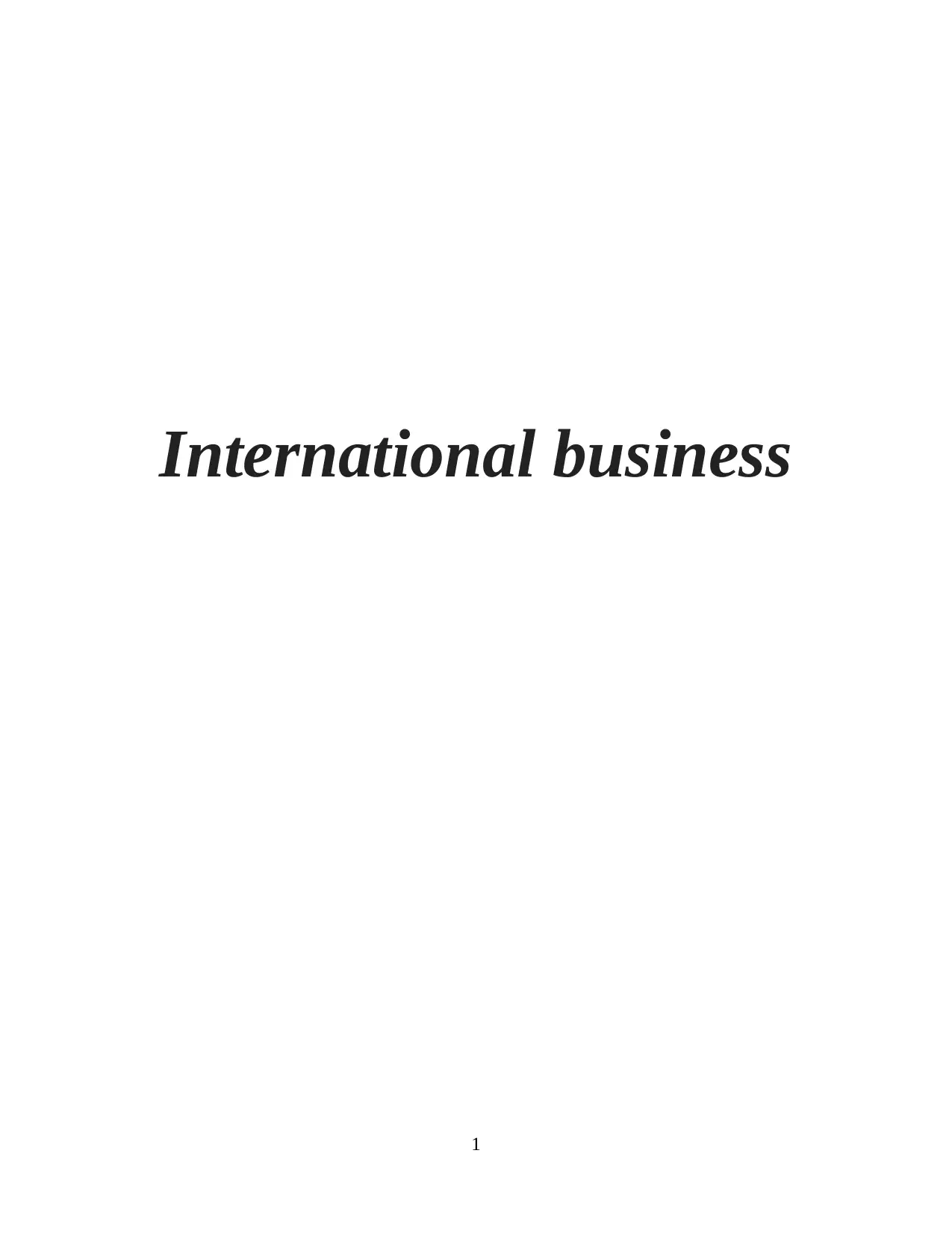
International business
1
1
Paraphrase This Document
Need a fresh take? Get an instant paraphrase of this document with our AI Paraphraser
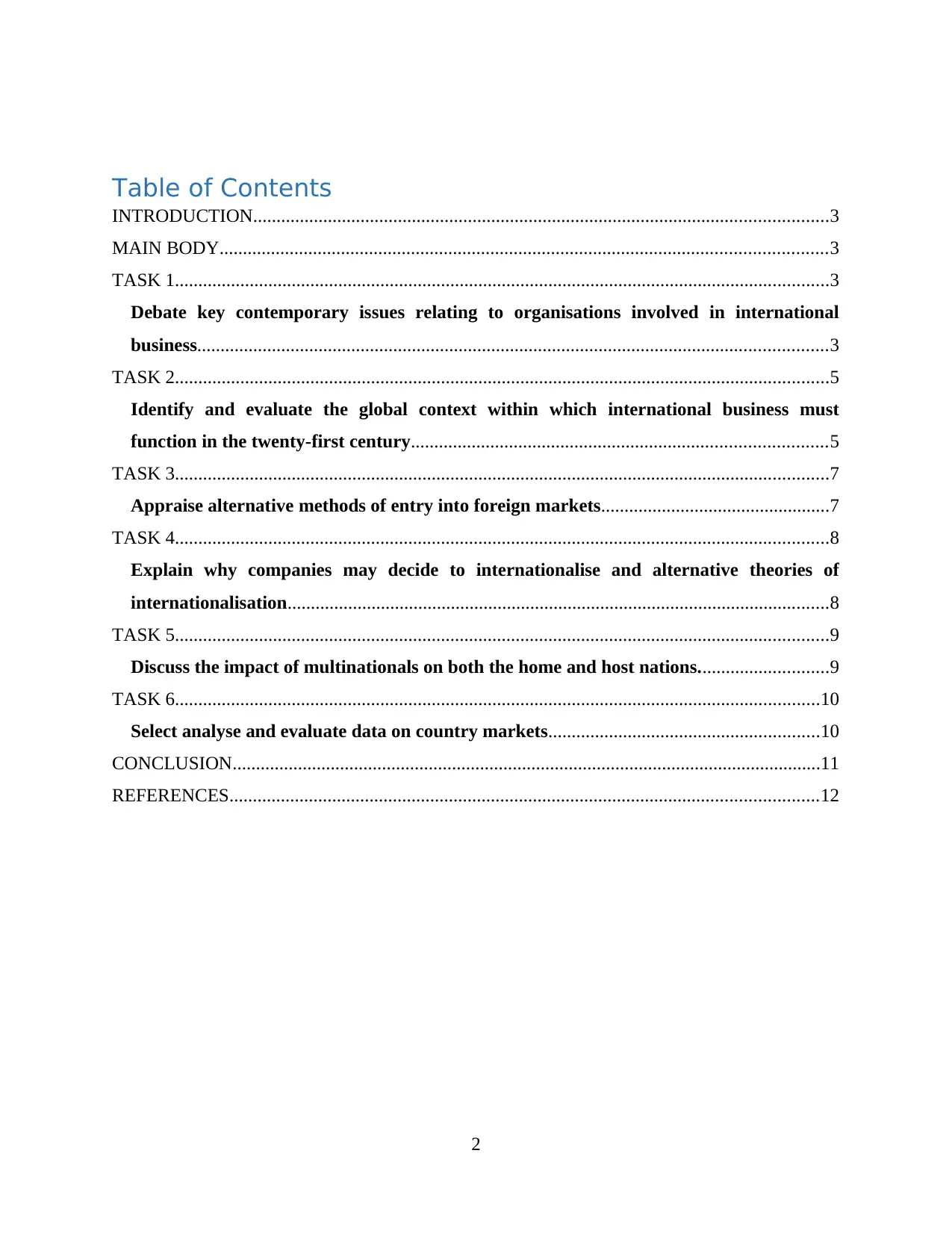
Table of Contents
INTRODUCTION...........................................................................................................................3
MAIN BODY..................................................................................................................................3
TASK 1............................................................................................................................................3
Debate key contemporary issues relating to organisations involved in international
business.......................................................................................................................................3
TASK 2............................................................................................................................................5
Identify and evaluate the global context within which international business must
function in the twenty-first century.........................................................................................5
TASK 3............................................................................................................................................7
Appraise alternative methods of entry into foreign markets.................................................7
TASK 4............................................................................................................................................8
Explain why companies may decide to internationalise and alternative theories of
internationalisation....................................................................................................................8
TASK 5............................................................................................................................................9
Discuss the impact of multinationals on both the home and host nations............................9
TASK 6..........................................................................................................................................10
Select analyse and evaluate data on country markets..........................................................10
CONCLUSION..............................................................................................................................11
REFERENCES..............................................................................................................................12
2
INTRODUCTION...........................................................................................................................3
MAIN BODY..................................................................................................................................3
TASK 1............................................................................................................................................3
Debate key contemporary issues relating to organisations involved in international
business.......................................................................................................................................3
TASK 2............................................................................................................................................5
Identify and evaluate the global context within which international business must
function in the twenty-first century.........................................................................................5
TASK 3............................................................................................................................................7
Appraise alternative methods of entry into foreign markets.................................................7
TASK 4............................................................................................................................................8
Explain why companies may decide to internationalise and alternative theories of
internationalisation....................................................................................................................8
TASK 5............................................................................................................................................9
Discuss the impact of multinationals on both the home and host nations............................9
TASK 6..........................................................................................................................................10
Select analyse and evaluate data on country markets..........................................................10
CONCLUSION..............................................................................................................................11
REFERENCES..............................................................................................................................12
2
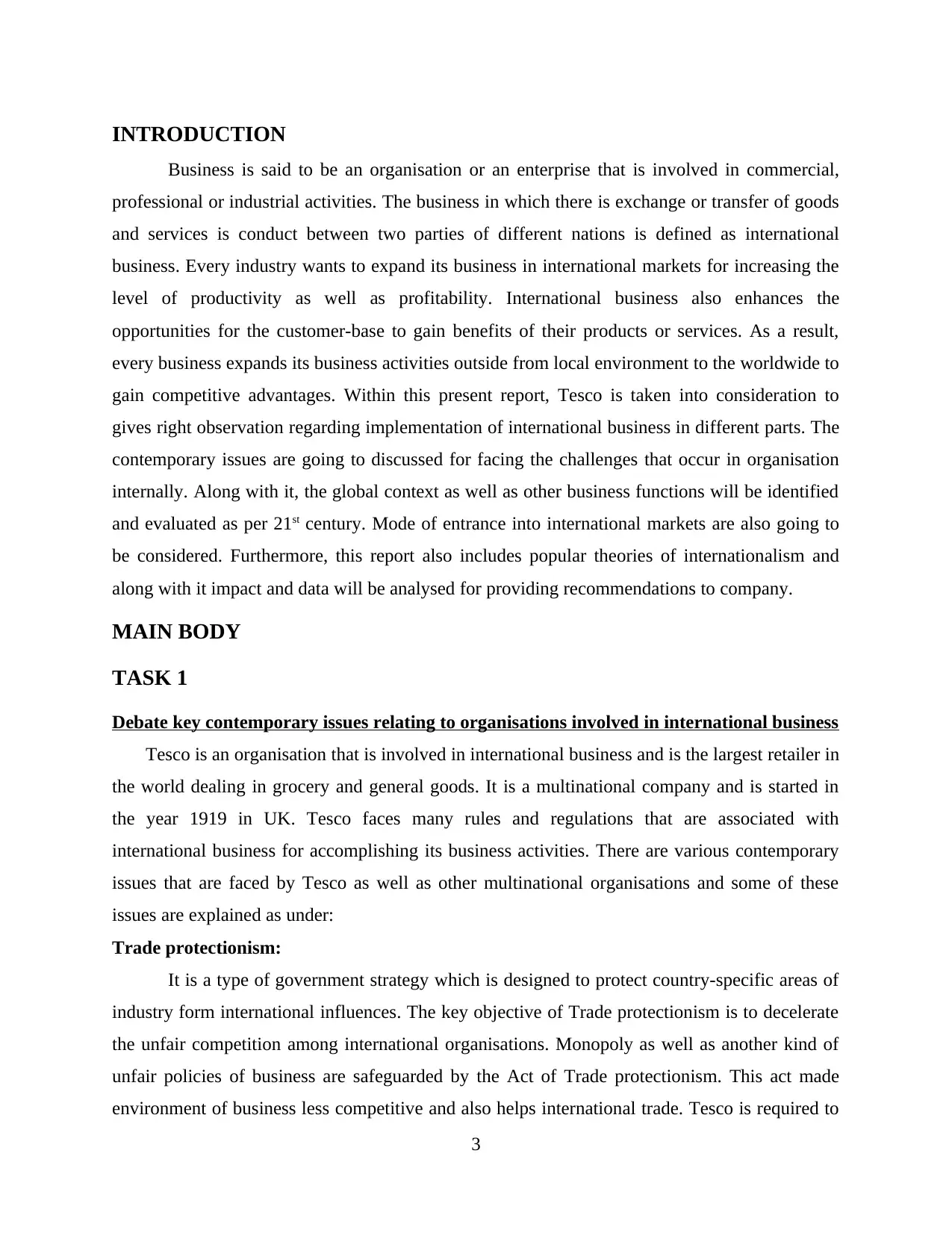
INTRODUCTION
Business is said to be an organisation or an enterprise that is involved in commercial,
professional or industrial activities. The business in which there is exchange or transfer of goods
and services is conduct between two parties of different nations is defined as international
business. Every industry wants to expand its business in international markets for increasing the
level of productivity as well as profitability. International business also enhances the
opportunities for the customer-base to gain benefits of their products or services. As a result,
every business expands its business activities outside from local environment to the worldwide to
gain competitive advantages. Within this present report, Tesco is taken into consideration to
gives right observation regarding implementation of international business in different parts. The
contemporary issues are going to discussed for facing the challenges that occur in organisation
internally. Along with it, the global context as well as other business functions will be identified
and evaluated as per 21st century. Mode of entrance into international markets are also going to
be considered. Furthermore, this report also includes popular theories of internationalism and
along with it impact and data will be analysed for providing recommendations to company.
MAIN BODY
TASK 1
Debate key contemporary issues relating to organisations involved in international business
Tesco is an organisation that is involved in international business and is the largest retailer in
the world dealing in grocery and general goods. It is a multinational company and is started in
the year 1919 in UK. Tesco faces many rules and regulations that are associated with
international business for accomplishing its business activities. There are various contemporary
issues that are faced by Tesco as well as other multinational organisations and some of these
issues are explained as under:
Trade protectionism:
It is a type of government strategy which is designed to protect country-specific areas of
industry form international influences. The key objective of Trade protectionism is to decelerate
the unfair competition among international organisations. Monopoly as well as another kind of
unfair policies of business are safeguarded by the Act of Trade protectionism. This act made
environment of business less competitive and also helps international trade. Tesco is required to
3
Business is said to be an organisation or an enterprise that is involved in commercial,
professional or industrial activities. The business in which there is exchange or transfer of goods
and services is conduct between two parties of different nations is defined as international
business. Every industry wants to expand its business in international markets for increasing the
level of productivity as well as profitability. International business also enhances the
opportunities for the customer-base to gain benefits of their products or services. As a result,
every business expands its business activities outside from local environment to the worldwide to
gain competitive advantages. Within this present report, Tesco is taken into consideration to
gives right observation regarding implementation of international business in different parts. The
contemporary issues are going to discussed for facing the challenges that occur in organisation
internally. Along with it, the global context as well as other business functions will be identified
and evaluated as per 21st century. Mode of entrance into international markets are also going to
be considered. Furthermore, this report also includes popular theories of internationalism and
along with it impact and data will be analysed for providing recommendations to company.
MAIN BODY
TASK 1
Debate key contemporary issues relating to organisations involved in international business
Tesco is an organisation that is involved in international business and is the largest retailer in
the world dealing in grocery and general goods. It is a multinational company and is started in
the year 1919 in UK. Tesco faces many rules and regulations that are associated with
international business for accomplishing its business activities. There are various contemporary
issues that are faced by Tesco as well as other multinational organisations and some of these
issues are explained as under:
Trade protectionism:
It is a type of government strategy which is designed to protect country-specific areas of
industry form international influences. The key objective of Trade protectionism is to decelerate
the unfair competition among international organisations. Monopoly as well as another kind of
unfair policies of business are safeguarded by the Act of Trade protectionism. This act made
environment of business less competitive and also helps international trade. Tesco is required to
3
⊘ This is a preview!⊘
Do you want full access?
Subscribe today to unlock all pages.

Trusted by 1+ million students worldwide
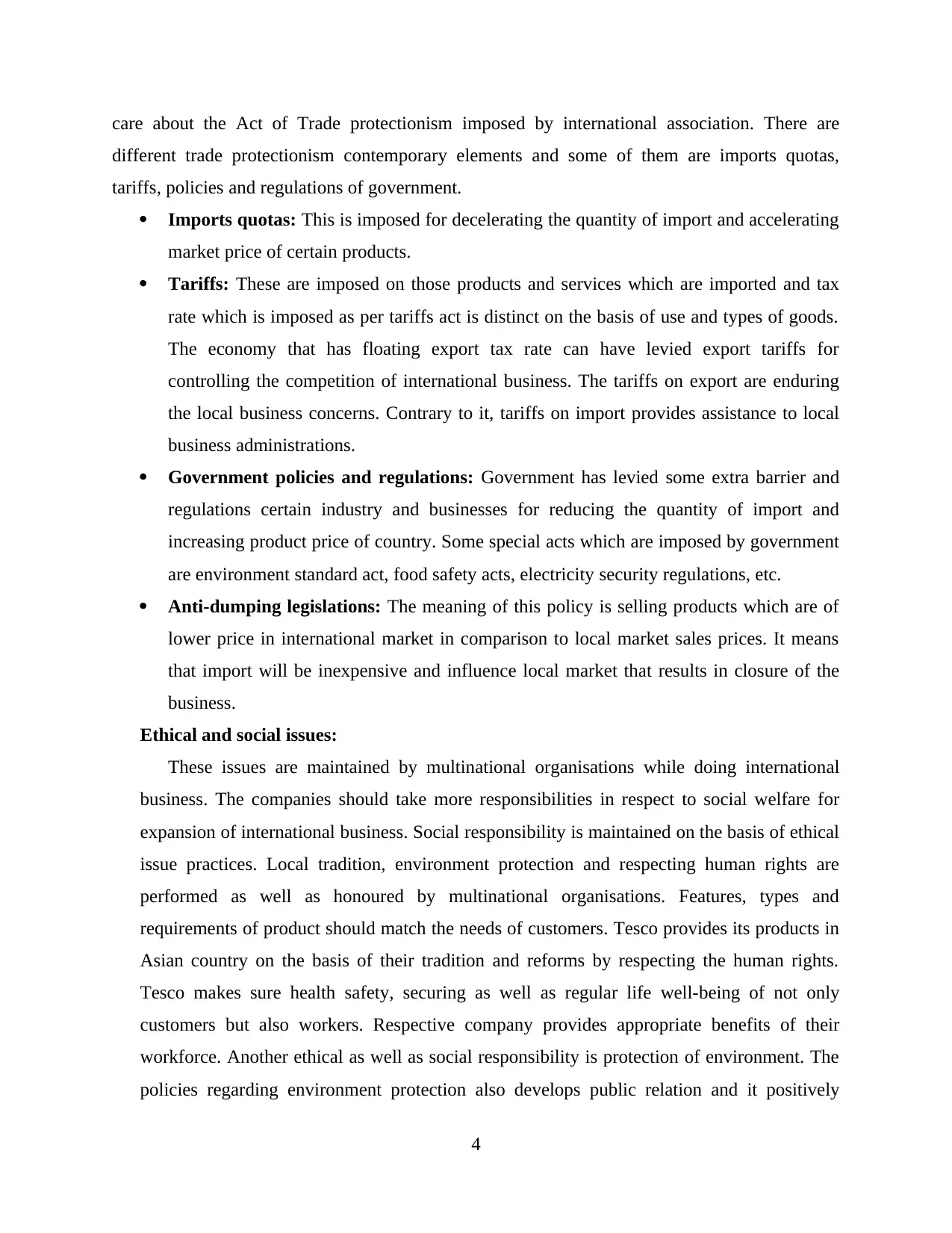
care about the Act of Trade protectionism imposed by international association. There are
different trade protectionism contemporary elements and some of them are imports quotas,
tariffs, policies and regulations of government.
Imports quotas: This is imposed for decelerating the quantity of import and accelerating
market price of certain products.
Tariffs: These are imposed on those products and services which are imported and tax
rate which is imposed as per tariffs act is distinct on the basis of use and types of goods.
The economy that has floating export tax rate can have levied export tariffs for
controlling the competition of international business. The tariffs on export are enduring
the local business concerns. Contrary to it, tariffs on import provides assistance to local
business administrations.
Government policies and regulations: Government has levied some extra barrier and
regulations certain industry and businesses for reducing the quantity of import and
increasing product price of country. Some special acts which are imposed by government
are environment standard act, food safety acts, electricity security regulations, etc.
Anti-dumping legislations: The meaning of this policy is selling products which are of
lower price in international market in comparison to local market sales prices. It means
that import will be inexpensive and influence local market that results in closure of the
business.
Ethical and social issues:
These issues are maintained by multinational organisations while doing international
business. The companies should take more responsibilities in respect to social welfare for
expansion of international business. Social responsibility is maintained on the basis of ethical
issue practices. Local tradition, environment protection and respecting human rights are
performed as well as honoured by multinational organisations. Features, types and
requirements of product should match the needs of customers. Tesco provides its products in
Asian country on the basis of their tradition and reforms by respecting the human rights.
Tesco makes sure health safety, securing as well as regular life well-being of not only
customers but also workers. Respective company provides appropriate benefits of their
workforce. Another ethical as well as social responsibility is protection of environment. The
policies regarding environment protection also develops public relation and it positively
4
different trade protectionism contemporary elements and some of them are imports quotas,
tariffs, policies and regulations of government.
Imports quotas: This is imposed for decelerating the quantity of import and accelerating
market price of certain products.
Tariffs: These are imposed on those products and services which are imported and tax
rate which is imposed as per tariffs act is distinct on the basis of use and types of goods.
The economy that has floating export tax rate can have levied export tariffs for
controlling the competition of international business. The tariffs on export are enduring
the local business concerns. Contrary to it, tariffs on import provides assistance to local
business administrations.
Government policies and regulations: Government has levied some extra barrier and
regulations certain industry and businesses for reducing the quantity of import and
increasing product price of country. Some special acts which are imposed by government
are environment standard act, food safety acts, electricity security regulations, etc.
Anti-dumping legislations: The meaning of this policy is selling products which are of
lower price in international market in comparison to local market sales prices. It means
that import will be inexpensive and influence local market that results in closure of the
business.
Ethical and social issues:
These issues are maintained by multinational organisations while doing international
business. The companies should take more responsibilities in respect to social welfare for
expansion of international business. Social responsibility is maintained on the basis of ethical
issue practices. Local tradition, environment protection and respecting human rights are
performed as well as honoured by multinational organisations. Features, types and
requirements of product should match the needs of customers. Tesco provides its products in
Asian country on the basis of their tradition and reforms by respecting the human rights.
Tesco makes sure health safety, securing as well as regular life well-being of not only
customers but also workers. Respective company provides appropriate benefits of their
workforce. Another ethical as well as social responsibility is protection of environment. The
policies regarding environment protection also develops public relation and it positively
4
Paraphrase This Document
Need a fresh take? Get an instant paraphrase of this document with our AI Paraphraser
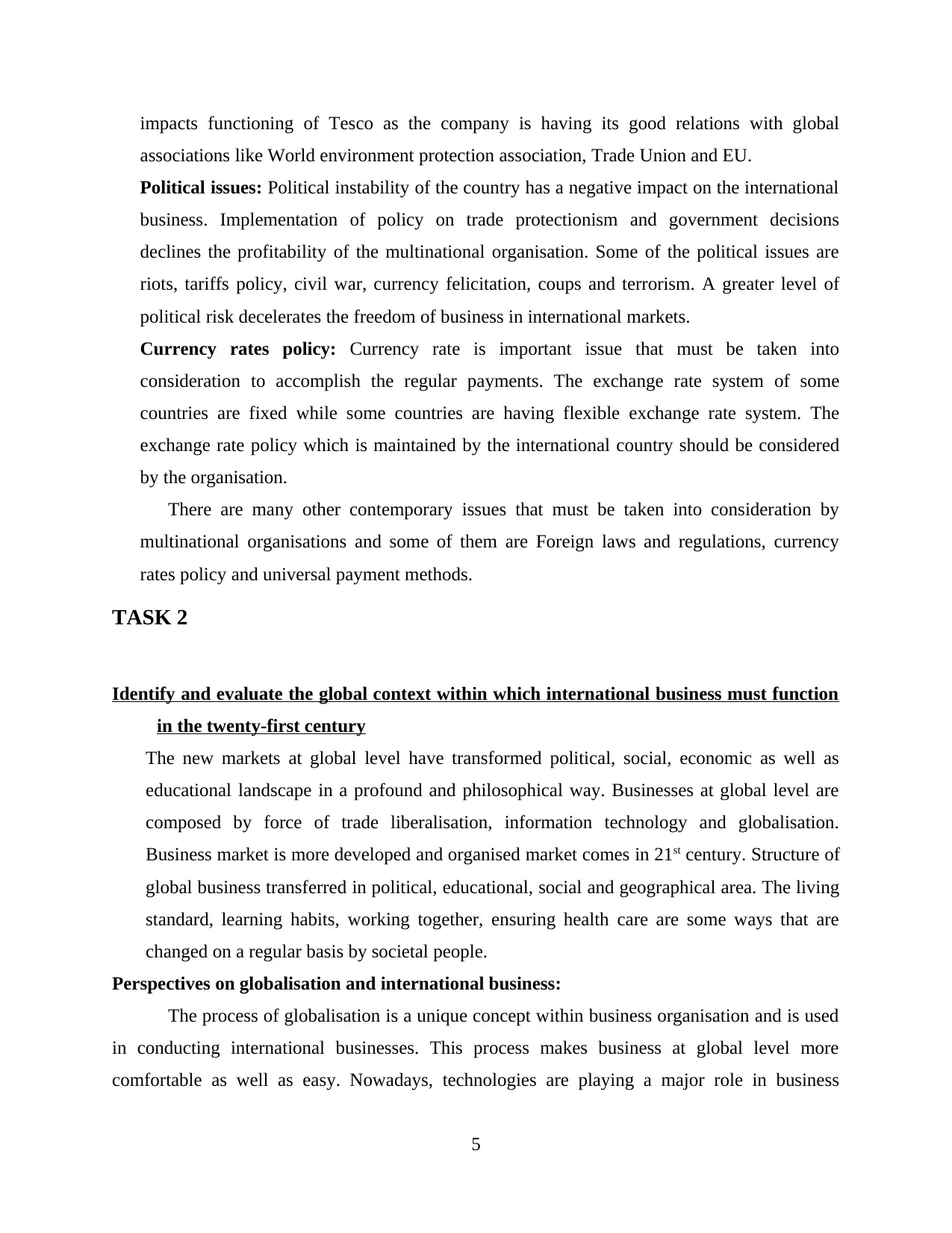
impacts functioning of Tesco as the company is having its good relations with global
associations like World environment protection association, Trade Union and EU.
Political issues: Political instability of the country has a negative impact on the international
business. Implementation of policy on trade protectionism and government decisions
declines the profitability of the multinational organisation. Some of the political issues are
riots, tariffs policy, civil war, currency felicitation, coups and terrorism. A greater level of
political risk decelerates the freedom of business in international markets.
Currency rates policy: Currency rate is important issue that must be taken into
consideration to accomplish the regular payments. The exchange rate system of some
countries are fixed while some countries are having flexible exchange rate system. The
exchange rate policy which is maintained by the international country should be considered
by the organisation.
There are many other contemporary issues that must be taken into consideration by
multinational organisations and some of them are Foreign laws and regulations, currency
rates policy and universal payment methods.
TASK 2
Identify and evaluate the global context within which international business must function
in the twenty-first century
The new markets at global level have transformed political, social, economic as well as
educational landscape in a profound and philosophical way. Businesses at global level are
composed by force of trade liberalisation, information technology and globalisation.
Business market is more developed and organised market comes in 21st century. Structure of
global business transferred in political, educational, social and geographical area. The living
standard, learning habits, working together, ensuring health care are some ways that are
changed on a regular basis by societal people.
Perspectives on globalisation and international business:
The process of globalisation is a unique concept within business organisation and is used
in conducting international businesses. This process makes business at global level more
comfortable as well as easy. Nowadays, technologies are playing a major role in business
5
associations like World environment protection association, Trade Union and EU.
Political issues: Political instability of the country has a negative impact on the international
business. Implementation of policy on trade protectionism and government decisions
declines the profitability of the multinational organisation. Some of the political issues are
riots, tariffs policy, civil war, currency felicitation, coups and terrorism. A greater level of
political risk decelerates the freedom of business in international markets.
Currency rates policy: Currency rate is important issue that must be taken into
consideration to accomplish the regular payments. The exchange rate system of some
countries are fixed while some countries are having flexible exchange rate system. The
exchange rate policy which is maintained by the international country should be considered
by the organisation.
There are many other contemporary issues that must be taken into consideration by
multinational organisations and some of them are Foreign laws and regulations, currency
rates policy and universal payment methods.
TASK 2
Identify and evaluate the global context within which international business must function
in the twenty-first century
The new markets at global level have transformed political, social, economic as well as
educational landscape in a profound and philosophical way. Businesses at global level are
composed by force of trade liberalisation, information technology and globalisation.
Business market is more developed and organised market comes in 21st century. Structure of
global business transferred in political, educational, social and geographical area. The living
standard, learning habits, working together, ensuring health care are some ways that are
changed on a regular basis by societal people.
Perspectives on globalisation and international business:
The process of globalisation is a unique concept within business organisation and is used
in conducting international businesses. This process makes business at global level more
comfortable as well as easy. Nowadays, technologies are playing a major role in business
5
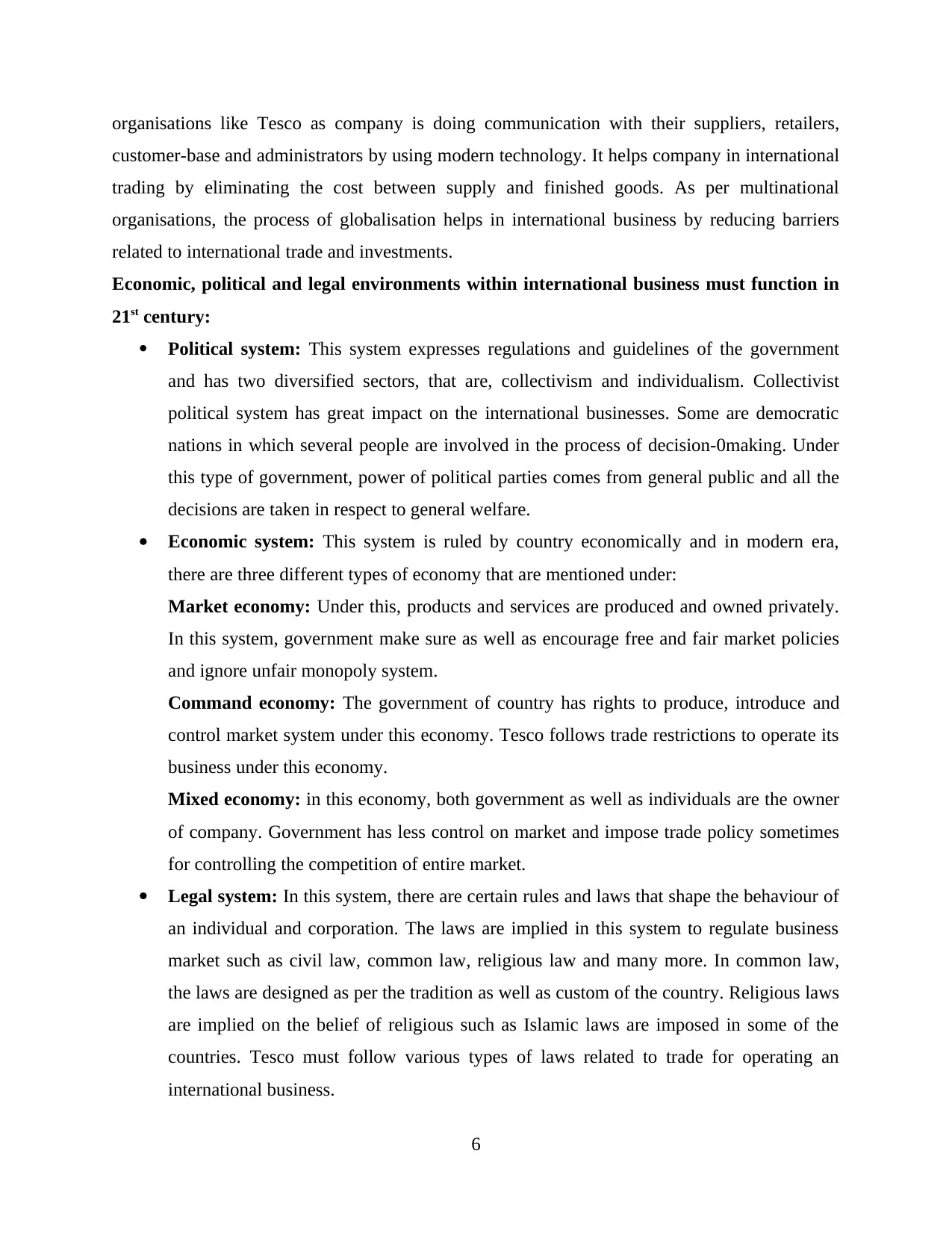
organisations like Tesco as company is doing communication with their suppliers, retailers,
customer-base and administrators by using modern technology. It helps company in international
trading by eliminating the cost between supply and finished goods. As per multinational
organisations, the process of globalisation helps in international business by reducing barriers
related to international trade and investments.
Economic, political and legal environments within international business must function in
21st century:
Political system: This system expresses regulations and guidelines of the government
and has two diversified sectors, that are, collectivism and individualism. Collectivist
political system has great impact on the international businesses. Some are democratic
nations in which several people are involved in the process of decision-0making. Under
this type of government, power of political parties comes from general public and all the
decisions are taken in respect to general welfare.
Economic system: This system is ruled by country economically and in modern era,
there are three different types of economy that are mentioned under:
Market economy: Under this, products and services are produced and owned privately.
In this system, government make sure as well as encourage free and fair market policies
and ignore unfair monopoly system.
Command economy: The government of country has rights to produce, introduce and
control market system under this economy. Tesco follows trade restrictions to operate its
business under this economy.
Mixed economy: in this economy, both government as well as individuals are the owner
of company. Government has less control on market and impose trade policy sometimes
for controlling the competition of entire market.
Legal system: In this system, there are certain rules and laws that shape the behaviour of
an individual and corporation. The laws are implied in this system to regulate business
market such as civil law, common law, religious law and many more. In common law,
the laws are designed as per the tradition as well as custom of the country. Religious laws
are implied on the belief of religious such as Islamic laws are imposed in some of the
countries. Tesco must follow various types of laws related to trade for operating an
international business.
6
customer-base and administrators by using modern technology. It helps company in international
trading by eliminating the cost between supply and finished goods. As per multinational
organisations, the process of globalisation helps in international business by reducing barriers
related to international trade and investments.
Economic, political and legal environments within international business must function in
21st century:
Political system: This system expresses regulations and guidelines of the government
and has two diversified sectors, that are, collectivism and individualism. Collectivist
political system has great impact on the international businesses. Some are democratic
nations in which several people are involved in the process of decision-0making. Under
this type of government, power of political parties comes from general public and all the
decisions are taken in respect to general welfare.
Economic system: This system is ruled by country economically and in modern era,
there are three different types of economy that are mentioned under:
Market economy: Under this, products and services are produced and owned privately.
In this system, government make sure as well as encourage free and fair market policies
and ignore unfair monopoly system.
Command economy: The government of country has rights to produce, introduce and
control market system under this economy. Tesco follows trade restrictions to operate its
business under this economy.
Mixed economy: in this economy, both government as well as individuals are the owner
of company. Government has less control on market and impose trade policy sometimes
for controlling the competition of entire market.
Legal system: In this system, there are certain rules and laws that shape the behaviour of
an individual and corporation. The laws are implied in this system to regulate business
market such as civil law, common law, religious law and many more. In common law,
the laws are designed as per the tradition as well as custom of the country. Religious laws
are implied on the belief of religious such as Islamic laws are imposed in some of the
countries. Tesco must follow various types of laws related to trade for operating an
international business.
6
⊘ This is a preview!⊘
Do you want full access?
Subscribe today to unlock all pages.

Trusted by 1+ million students worldwide
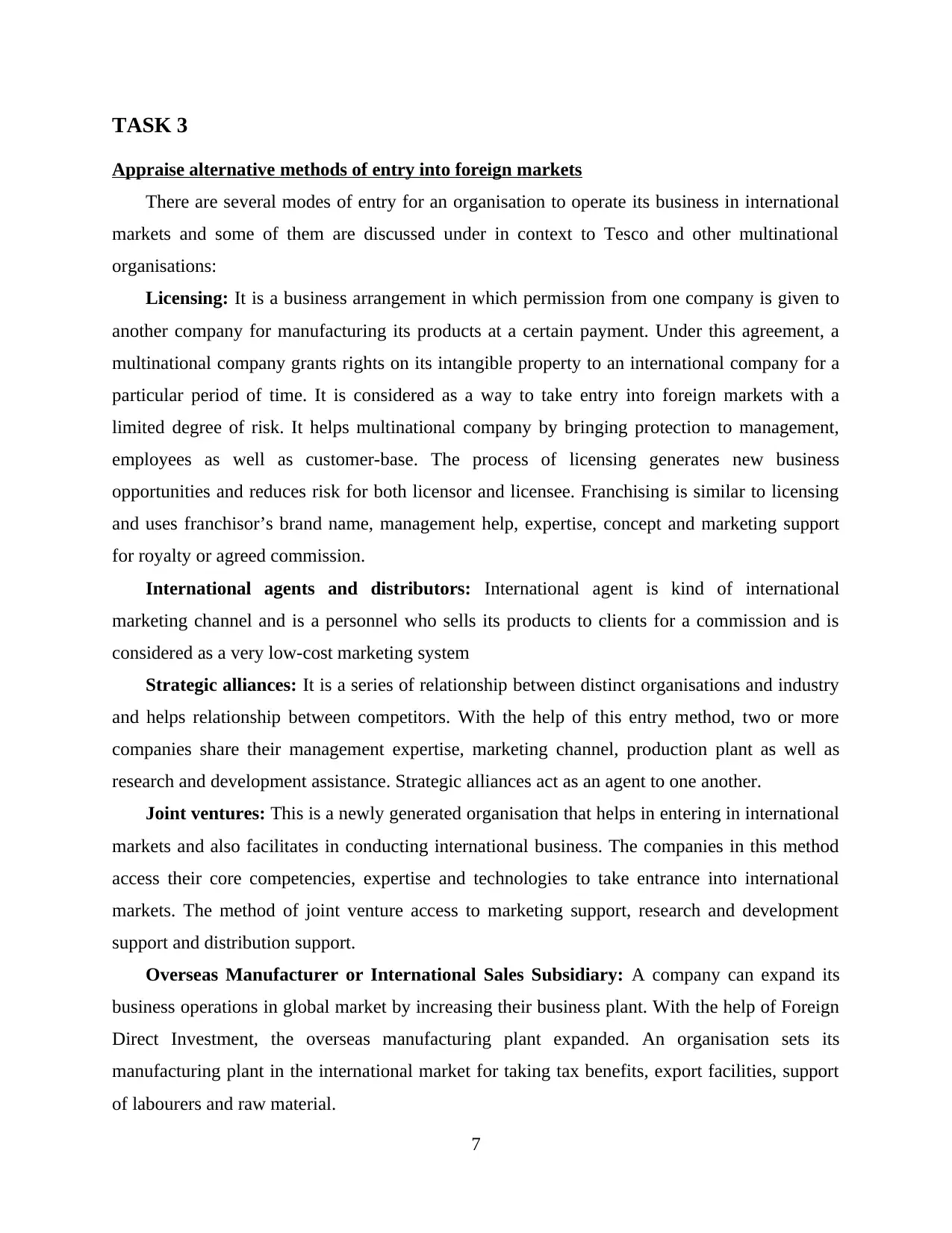
TASK 3
Appraise alternative methods of entry into foreign markets
There are several modes of entry for an organisation to operate its business in international
markets and some of them are discussed under in context to Tesco and other multinational
organisations:
Licensing: It is a business arrangement in which permission from one company is given to
another company for manufacturing its products at a certain payment. Under this agreement, a
multinational company grants rights on its intangible property to an international company for a
particular period of time. It is considered as a way to take entry into foreign markets with a
limited degree of risk. It helps multinational company by bringing protection to management,
employees as well as customer-base. The process of licensing generates new business
opportunities and reduces risk for both licensor and licensee. Franchising is similar to licensing
and uses franchisor’s brand name, management help, expertise, concept and marketing support
for royalty or agreed commission.
International agents and distributors: International agent is kind of international
marketing channel and is a personnel who sells its products to clients for a commission and is
considered as a very low-cost marketing system
Strategic alliances: It is a series of relationship between distinct organisations and industry
and helps relationship between competitors. With the help of this entry method, two or more
companies share their management expertise, marketing channel, production plant as well as
research and development assistance. Strategic alliances act as an agent to one another.
Joint ventures: This is a newly generated organisation that helps in entering in international
markets and also facilitates in conducting international business. The companies in this method
access their core competencies, expertise and technologies to take entrance into international
markets. The method of joint venture access to marketing support, research and development
support and distribution support.
Overseas Manufacturer or International Sales Subsidiary: A company can expand its
business operations in global market by increasing their business plant. With the help of Foreign
Direct Investment, the overseas manufacturing plant expanded. An organisation sets its
manufacturing plant in the international market for taking tax benefits, export facilities, support
of labourers and raw material.
7
Appraise alternative methods of entry into foreign markets
There are several modes of entry for an organisation to operate its business in international
markets and some of them are discussed under in context to Tesco and other multinational
organisations:
Licensing: It is a business arrangement in which permission from one company is given to
another company for manufacturing its products at a certain payment. Under this agreement, a
multinational company grants rights on its intangible property to an international company for a
particular period of time. It is considered as a way to take entry into foreign markets with a
limited degree of risk. It helps multinational company by bringing protection to management,
employees as well as customer-base. The process of licensing generates new business
opportunities and reduces risk for both licensor and licensee. Franchising is similar to licensing
and uses franchisor’s brand name, management help, expertise, concept and marketing support
for royalty or agreed commission.
International agents and distributors: International agent is kind of international
marketing channel and is a personnel who sells its products to clients for a commission and is
considered as a very low-cost marketing system
Strategic alliances: It is a series of relationship between distinct organisations and industry
and helps relationship between competitors. With the help of this entry method, two or more
companies share their management expertise, marketing channel, production plant as well as
research and development assistance. Strategic alliances act as an agent to one another.
Joint ventures: This is a newly generated organisation that helps in entering in international
markets and also facilitates in conducting international business. The companies in this method
access their core competencies, expertise and technologies to take entrance into international
markets. The method of joint venture access to marketing support, research and development
support and distribution support.
Overseas Manufacturer or International Sales Subsidiary: A company can expand its
business operations in global market by increasing their business plant. With the help of Foreign
Direct Investment, the overseas manufacturing plant expanded. An organisation sets its
manufacturing plant in the international market for taking tax benefits, export facilities, support
of labourers and raw material.
7
Paraphrase This Document
Need a fresh take? Get an instant paraphrase of this document with our AI Paraphraser
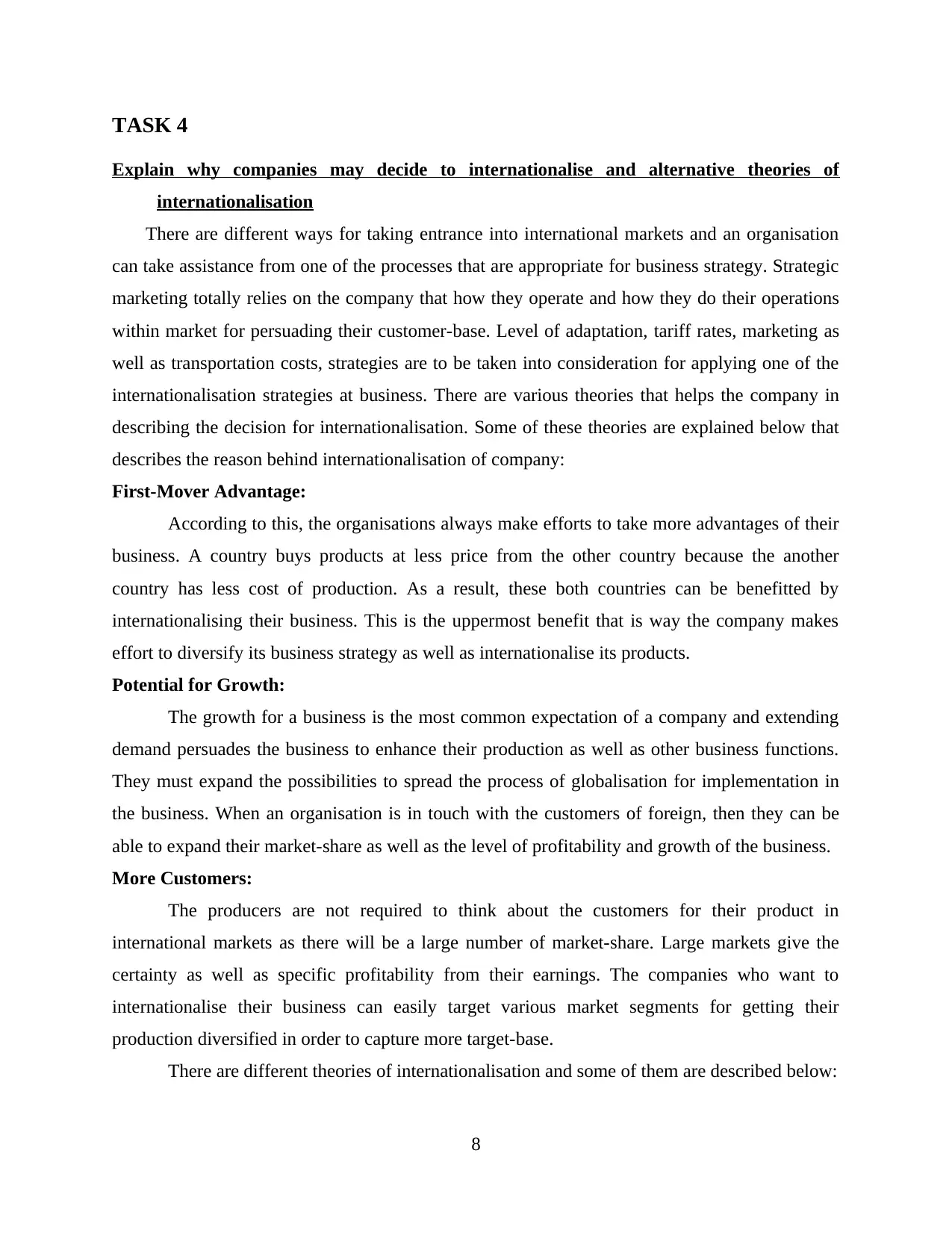
TASK 4
Explain why companies may decide to internationalise and alternative theories of
internationalisation
There are different ways for taking entrance into international markets and an organisation
can take assistance from one of the processes that are appropriate for business strategy. Strategic
marketing totally relies on the company that how they operate and how they do their operations
within market for persuading their customer-base. Level of adaptation, tariff rates, marketing as
well as transportation costs, strategies are to be taken into consideration for applying one of the
internationalisation strategies at business. There are various theories that helps the company in
describing the decision for internationalisation. Some of these theories are explained below that
describes the reason behind internationalisation of company:
First-Mover Advantage:
According to this, the organisations always make efforts to take more advantages of their
business. A country buys products at less price from the other country because the another
country has less cost of production. As a result, these both countries can be benefitted by
internationalising their business. This is the uppermost benefit that is way the company makes
effort to diversify its business strategy as well as internationalise its products.
Potential for Growth:
The growth for a business is the most common expectation of a company and extending
demand persuades the business to enhance their production as well as other business functions.
They must expand the possibilities to spread the process of globalisation for implementation in
the business. When an organisation is in touch with the customers of foreign, then they can be
able to expand their market-share as well as the level of profitability and growth of the business.
More Customers:
The producers are not required to think about the customers for their product in
international markets as there will be a large number of market-share. Large markets give the
certainty as well as specific profitability from their earnings. The companies who want to
internationalise their business can easily target various market segments for getting their
production diversified in order to capture more target-base.
There are different theories of internationalisation and some of them are described below:
8
Explain why companies may decide to internationalise and alternative theories of
internationalisation
There are different ways for taking entrance into international markets and an organisation
can take assistance from one of the processes that are appropriate for business strategy. Strategic
marketing totally relies on the company that how they operate and how they do their operations
within market for persuading their customer-base. Level of adaptation, tariff rates, marketing as
well as transportation costs, strategies are to be taken into consideration for applying one of the
internationalisation strategies at business. There are various theories that helps the company in
describing the decision for internationalisation. Some of these theories are explained below that
describes the reason behind internationalisation of company:
First-Mover Advantage:
According to this, the organisations always make efforts to take more advantages of their
business. A country buys products at less price from the other country because the another
country has less cost of production. As a result, these both countries can be benefitted by
internationalising their business. This is the uppermost benefit that is way the company makes
effort to diversify its business strategy as well as internationalise its products.
Potential for Growth:
The growth for a business is the most common expectation of a company and extending
demand persuades the business to enhance their production as well as other business functions.
They must expand the possibilities to spread the process of globalisation for implementation in
the business. When an organisation is in touch with the customers of foreign, then they can be
able to expand their market-share as well as the level of profitability and growth of the business.
More Customers:
The producers are not required to think about the customers for their product in
international markets as there will be a large number of market-share. Large markets give the
certainty as well as specific profitability from their earnings. The companies who want to
internationalise their business can easily target various market segments for getting their
production diversified in order to capture more target-base.
There are different theories of internationalisation and some of them are described below:
8
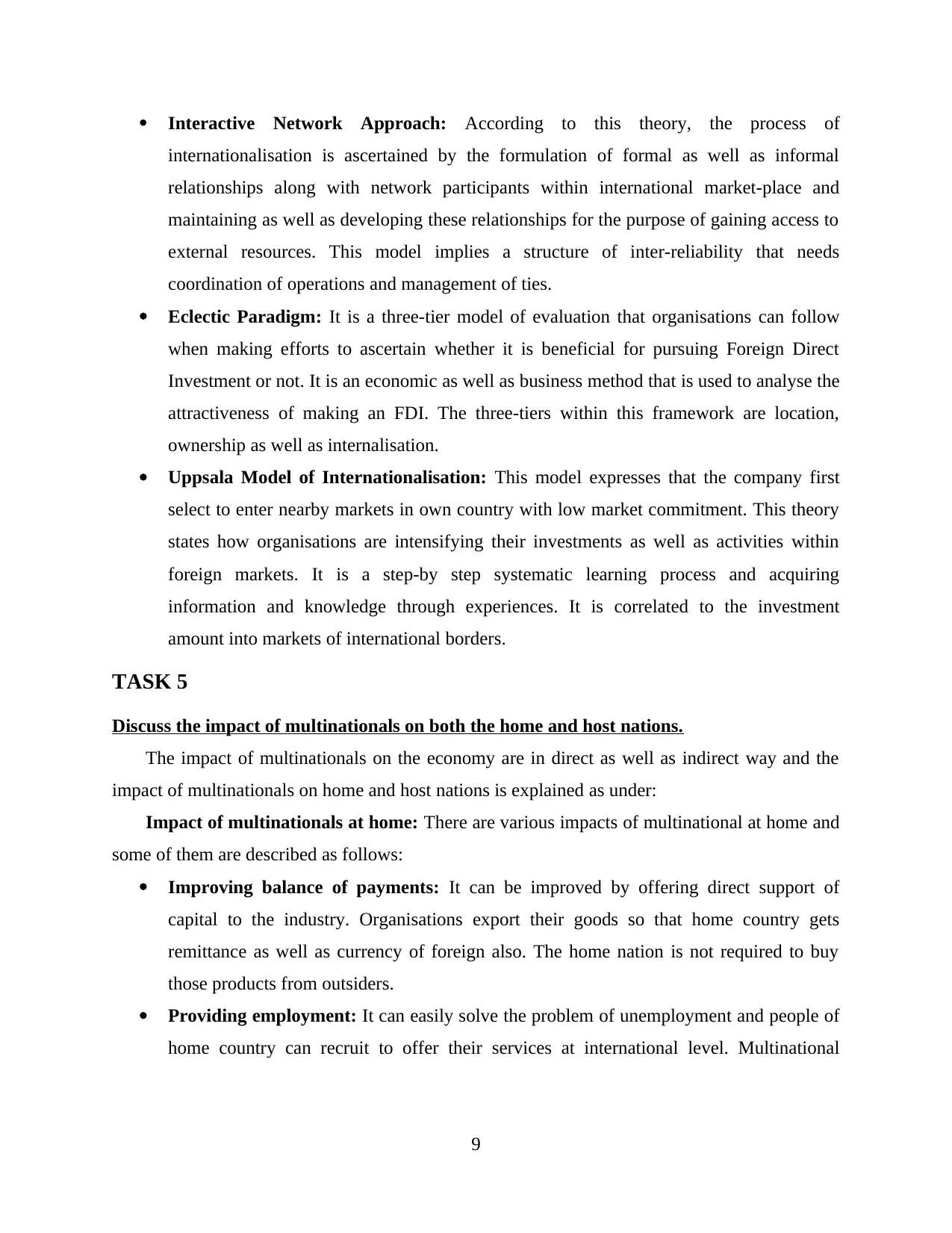
Interactive Network Approach: According to this theory, the process of
internationalisation is ascertained by the formulation of formal as well as informal
relationships along with network participants within international market-place and
maintaining as well as developing these relationships for the purpose of gaining access to
external resources. This model implies a structure of inter-reliability that needs
coordination of operations and management of ties.
Eclectic Paradigm: It is a three-tier model of evaluation that organisations can follow
when making efforts to ascertain whether it is beneficial for pursuing Foreign Direct
Investment or not. It is an economic as well as business method that is used to analyse the
attractiveness of making an FDI. The three-tiers within this framework are location,
ownership as well as internalisation.
Uppsala Model of Internationalisation: This model expresses that the company first
select to enter nearby markets in own country with low market commitment. This theory
states how organisations are intensifying their investments as well as activities within
foreign markets. It is a step-by step systematic learning process and acquiring
information and knowledge through experiences. It is correlated to the investment
amount into markets of international borders.
TASK 5
Discuss the impact of multinationals on both the home and host nations.
The impact of multinationals on the economy are in direct as well as indirect way and the
impact of multinationals on home and host nations is explained as under:
Impact of multinationals at home: There are various impacts of multinational at home and
some of them are described as follows:
Improving balance of payments: It can be improved by offering direct support of
capital to the industry. Organisations export their goods so that home country gets
remittance as well as currency of foreign also. The home nation is not required to buy
those products from outsiders.
Providing employment: It can easily solve the problem of unemployment and people of
home country can recruit to offer their services at international level. Multinational
9
internationalisation is ascertained by the formulation of formal as well as informal
relationships along with network participants within international market-place and
maintaining as well as developing these relationships for the purpose of gaining access to
external resources. This model implies a structure of inter-reliability that needs
coordination of operations and management of ties.
Eclectic Paradigm: It is a three-tier model of evaluation that organisations can follow
when making efforts to ascertain whether it is beneficial for pursuing Foreign Direct
Investment or not. It is an economic as well as business method that is used to analyse the
attractiveness of making an FDI. The three-tiers within this framework are location,
ownership as well as internalisation.
Uppsala Model of Internationalisation: This model expresses that the company first
select to enter nearby markets in own country with low market commitment. This theory
states how organisations are intensifying their investments as well as activities within
foreign markets. It is a step-by step systematic learning process and acquiring
information and knowledge through experiences. It is correlated to the investment
amount into markets of international borders.
TASK 5
Discuss the impact of multinationals on both the home and host nations.
The impact of multinationals on the economy are in direct as well as indirect way and the
impact of multinationals on home and host nations is explained as under:
Impact of multinationals at home: There are various impacts of multinational at home and
some of them are described as follows:
Improving balance of payments: It can be improved by offering direct support of
capital to the industry. Organisations export their goods so that home country gets
remittance as well as currency of foreign also. The home nation is not required to buy
those products from outsiders.
Providing employment: It can easily solve the problem of unemployment and people of
home country can recruit to offer their services at international level. Multinational
9
⊘ This is a preview!⊘
Do you want full access?
Subscribe today to unlock all pages.

Trusted by 1+ million students worldwide
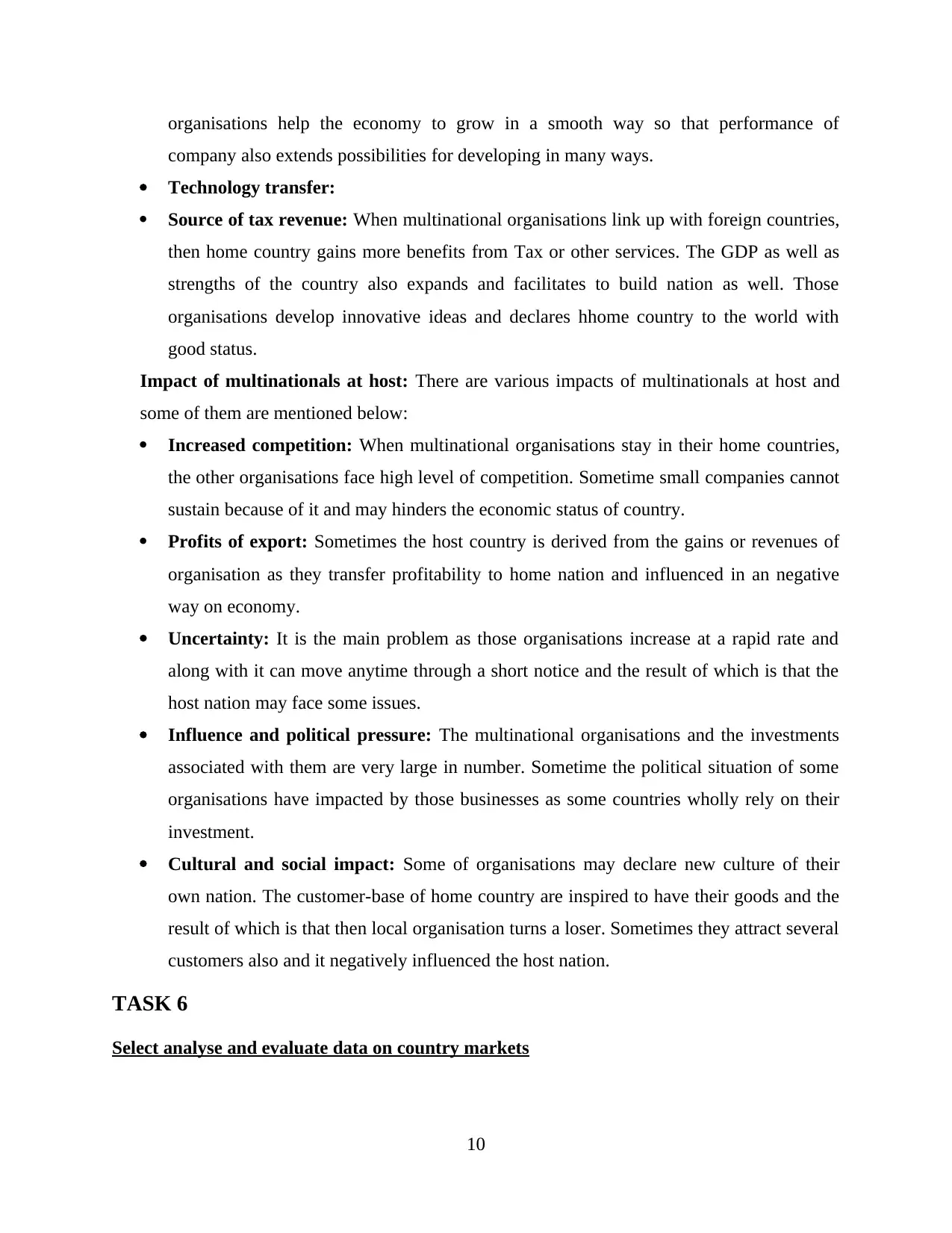
organisations help the economy to grow in a smooth way so that performance of
company also extends possibilities for developing in many ways.
Technology transfer:
Source of tax revenue: When multinational organisations link up with foreign countries,
then home country gains more benefits from Tax or other services. The GDP as well as
strengths of the country also expands and facilitates to build nation as well. Those
organisations develop innovative ideas and declares hhome country to the world with
good status.
Impact of multinationals at host: There are various impacts of multinationals at host and
some of them are mentioned below:
Increased competition: When multinational organisations stay in their home countries,
the other organisations face high level of competition. Sometime small companies cannot
sustain because of it and may hinders the economic status of country.
Profits of export: Sometimes the host country is derived from the gains or revenues of
organisation as they transfer profitability to home nation and influenced in an negative
way on economy.
Uncertainty: It is the main problem as those organisations increase at a rapid rate and
along with it can move anytime through a short notice and the result of which is that the
host nation may face some issues.
Influence and political pressure: The multinational organisations and the investments
associated with them are very large in number. Sometime the political situation of some
organisations have impacted by those businesses as some countries wholly rely on their
investment.
Cultural and social impact: Some of organisations may declare new culture of their
own nation. The customer-base of home country are inspired to have their goods and the
result of which is that then local organisation turns a loser. Sometimes they attract several
customers also and it negatively influenced the host nation.
TASK 6
Select analyse and evaluate data on country markets
10
company also extends possibilities for developing in many ways.
Technology transfer:
Source of tax revenue: When multinational organisations link up with foreign countries,
then home country gains more benefits from Tax or other services. The GDP as well as
strengths of the country also expands and facilitates to build nation as well. Those
organisations develop innovative ideas and declares hhome country to the world with
good status.
Impact of multinationals at host: There are various impacts of multinationals at host and
some of them are mentioned below:
Increased competition: When multinational organisations stay in their home countries,
the other organisations face high level of competition. Sometime small companies cannot
sustain because of it and may hinders the economic status of country.
Profits of export: Sometimes the host country is derived from the gains or revenues of
organisation as they transfer profitability to home nation and influenced in an negative
way on economy.
Uncertainty: It is the main problem as those organisations increase at a rapid rate and
along with it can move anytime through a short notice and the result of which is that the
host nation may face some issues.
Influence and political pressure: The multinational organisations and the investments
associated with them are very large in number. Sometime the political situation of some
organisations have impacted by those businesses as some countries wholly rely on their
investment.
Cultural and social impact: Some of organisations may declare new culture of their
own nation. The customer-base of home country are inspired to have their goods and the
result of which is that then local organisation turns a loser. Sometimes they attract several
customers also and it negatively influenced the host nation.
TASK 6
Select analyse and evaluate data on country markets
10
Paraphrase This Document
Need a fresh take? Get an instant paraphrase of this document with our AI Paraphraser
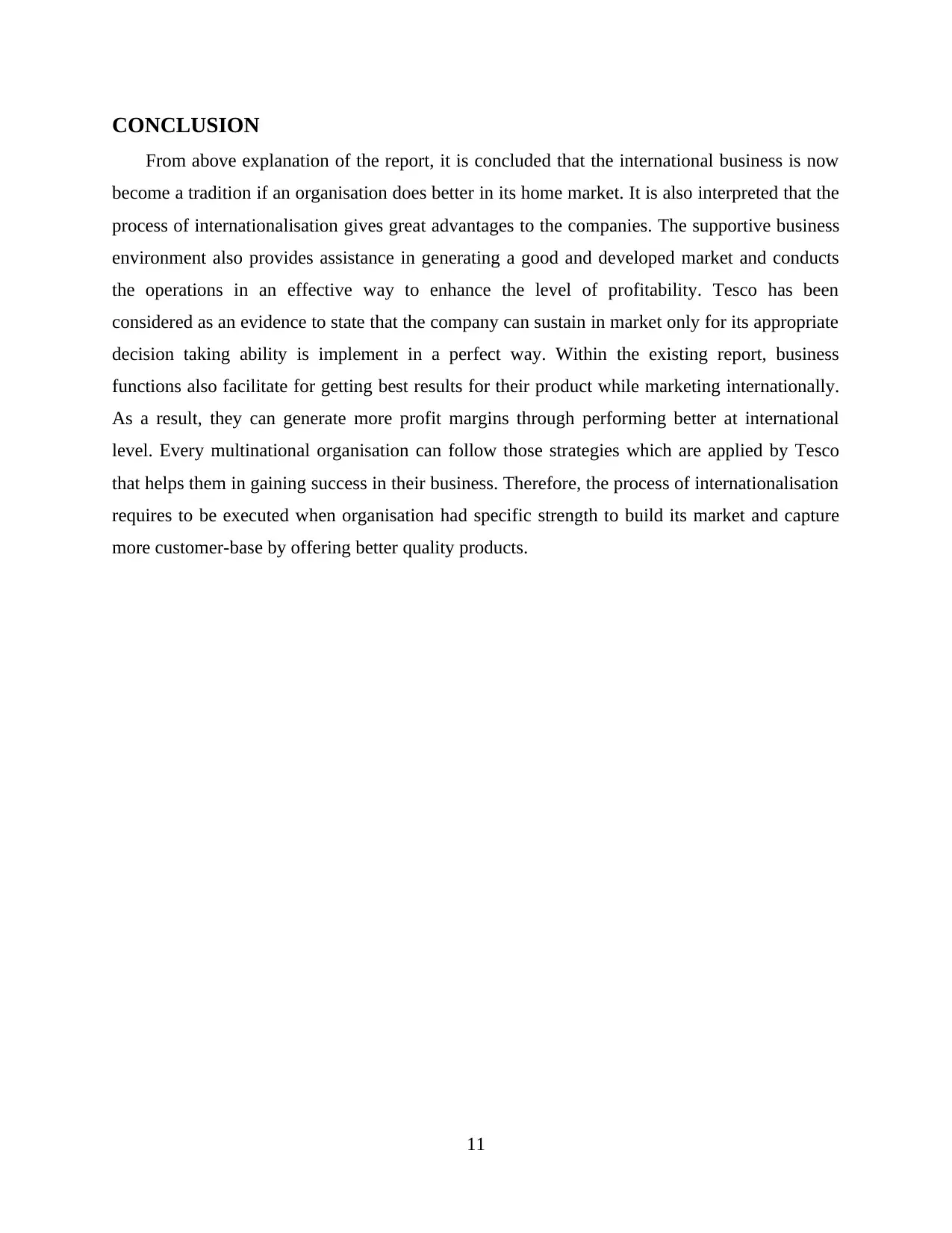
CONCLUSION
From above explanation of the report, it is concluded that the international business is now
become a tradition if an organisation does better in its home market. It is also interpreted that the
process of internationalisation gives great advantages to the companies. The supportive business
environment also provides assistance in generating a good and developed market and conducts
the operations in an effective way to enhance the level of profitability. Tesco has been
considered as an evidence to state that the company can sustain in market only for its appropriate
decision taking ability is implement in a perfect way. Within the existing report, business
functions also facilitate for getting best results for their product while marketing internationally.
As a result, they can generate more profit margins through performing better at international
level. Every multinational organisation can follow those strategies which are applied by Tesco
that helps them in gaining success in their business. Therefore, the process of internationalisation
requires to be executed when organisation had specific strength to build its market and capture
more customer-base by offering better quality products.
11
From above explanation of the report, it is concluded that the international business is now
become a tradition if an organisation does better in its home market. It is also interpreted that the
process of internationalisation gives great advantages to the companies. The supportive business
environment also provides assistance in generating a good and developed market and conducts
the operations in an effective way to enhance the level of profitability. Tesco has been
considered as an evidence to state that the company can sustain in market only for its appropriate
decision taking ability is implement in a perfect way. Within the existing report, business
functions also facilitate for getting best results for their product while marketing internationally.
As a result, they can generate more profit margins through performing better at international
level. Every multinational organisation can follow those strategies which are applied by Tesco
that helps them in gaining success in their business. Therefore, the process of internationalisation
requires to be executed when organisation had specific strength to build its market and capture
more customer-base by offering better quality products.
11
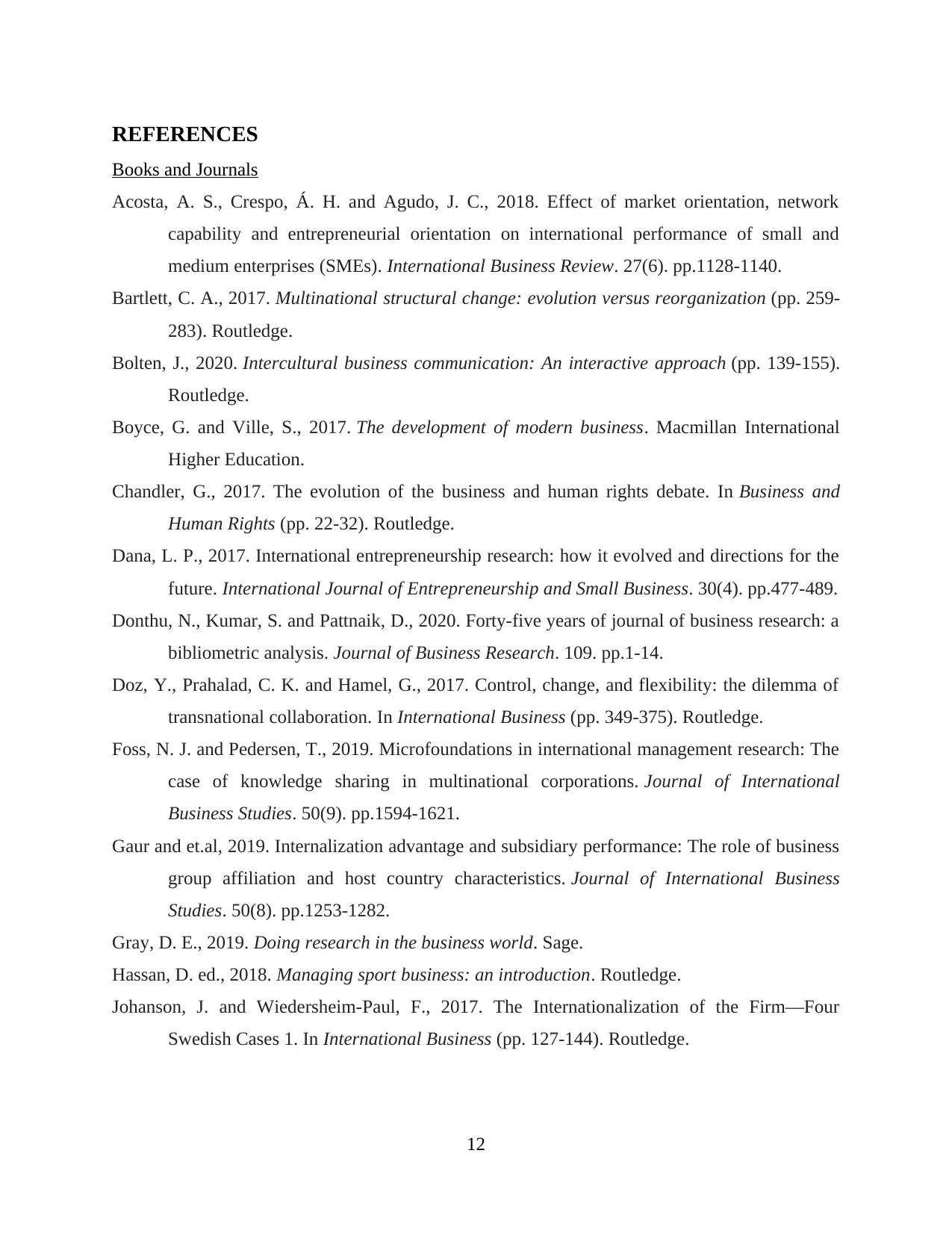
REFERENCES
Books and Journals
Acosta, A. S., Crespo, Á. H. and Agudo, J. C., 2018. Effect of market orientation, network
capability and entrepreneurial orientation on international performance of small and
medium enterprises (SMEs). International Business Review. 27(6). pp.1128-1140.
Bartlett, C. A., 2017. Multinational structural change: evolution versus reorganization (pp. 259-
283). Routledge.
Bolten, J., 2020. Intercultural business communication: An interactive approach (pp. 139-155).
Routledge.
Boyce, G. and Ville, S., 2017. The development of modern business. Macmillan International
Higher Education.
Chandler, G., 2017. The evolution of the business and human rights debate. In Business and
Human Rights (pp. 22-32). Routledge.
Dana, L. P., 2017. International entrepreneurship research: how it evolved and directions for the
future. International Journal of Entrepreneurship and Small Business. 30(4). pp.477-489.
Donthu, N., Kumar, S. and Pattnaik, D., 2020. Forty-five years of journal of business research: a
bibliometric analysis. Journal of Business Research. 109. pp.1-14.
Doz, Y., Prahalad, C. K. and Hamel, G., 2017. Control, change, and flexibility: the dilemma of
transnational collaboration. In International Business (pp. 349-375). Routledge.
Foss, N. J. and Pedersen, T., 2019. Microfoundations in international management research: The
case of knowledge sharing in multinational corporations. Journal of International
Business Studies. 50(9). pp.1594-1621.
Gaur and et.al, 2019. Internalization advantage and subsidiary performance: The role of business
group affiliation and host country characteristics. Journal of International Business
Studies. 50(8). pp.1253-1282.
Gray, D. E., 2019. Doing research in the business world. Sage.
Hassan, D. ed., 2018. Managing sport business: an introduction. Routledge.
Johanson, J. and Wiedersheim-Paul, F., 2017. The Internationalization of the Firm—Four
Swedish Cases 1. In International Business (pp. 127-144). Routledge.
12
Books and Journals
Acosta, A. S., Crespo, Á. H. and Agudo, J. C., 2018. Effect of market orientation, network
capability and entrepreneurial orientation on international performance of small and
medium enterprises (SMEs). International Business Review. 27(6). pp.1128-1140.
Bartlett, C. A., 2017. Multinational structural change: evolution versus reorganization (pp. 259-
283). Routledge.
Bolten, J., 2020. Intercultural business communication: An interactive approach (pp. 139-155).
Routledge.
Boyce, G. and Ville, S., 2017. The development of modern business. Macmillan International
Higher Education.
Chandler, G., 2017. The evolution of the business and human rights debate. In Business and
Human Rights (pp. 22-32). Routledge.
Dana, L. P., 2017. International entrepreneurship research: how it evolved and directions for the
future. International Journal of Entrepreneurship and Small Business. 30(4). pp.477-489.
Donthu, N., Kumar, S. and Pattnaik, D., 2020. Forty-five years of journal of business research: a
bibliometric analysis. Journal of Business Research. 109. pp.1-14.
Doz, Y., Prahalad, C. K. and Hamel, G., 2017. Control, change, and flexibility: the dilemma of
transnational collaboration. In International Business (pp. 349-375). Routledge.
Foss, N. J. and Pedersen, T., 2019. Microfoundations in international management research: The
case of knowledge sharing in multinational corporations. Journal of International
Business Studies. 50(9). pp.1594-1621.
Gaur and et.al, 2019. Internalization advantage and subsidiary performance: The role of business
group affiliation and host country characteristics. Journal of International Business
Studies. 50(8). pp.1253-1282.
Gray, D. E., 2019. Doing research in the business world. Sage.
Hassan, D. ed., 2018. Managing sport business: an introduction. Routledge.
Johanson, J. and Wiedersheim-Paul, F., 2017. The Internationalization of the Firm—Four
Swedish Cases 1. In International Business (pp. 127-144). Routledge.
12
⊘ This is a preview!⊘
Do you want full access?
Subscribe today to unlock all pages.

Trusted by 1+ million students worldwide
1 out of 13
Related Documents
Your All-in-One AI-Powered Toolkit for Academic Success.
+13062052269
info@desklib.com
Available 24*7 on WhatsApp / Email
![[object Object]](/_next/static/media/star-bottom.7253800d.svg)
Unlock your academic potential
Copyright © 2020–2026 A2Z Services. All Rights Reserved. Developed and managed by ZUCOL.



